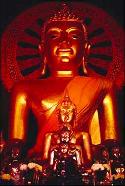|
A message from
the Creator would be expected to be unique in addressing His
rationale for the origin and purpose of all things. More specifically,
a genuine message from the Creator would be expected to:
- Explain the
origin and purpose of all things
- Be a message
like no other; exclusive in its supremacy over man's collective
wisdom.
- It would address
man's complete situation -regardless of race, age, sex, education,
politics, economic standing, or culture, etc.
- It would be
addressed to the masses, not an elite few and written in plain
language.
- It would resonate
harmonically with our instinctive beliefs and perceptions about
GOD, as observed through nature.
- It would address
our basic needs -morally, spiritually, emotionally, materially
and intellectually.
- It would provide
hope for the greater good of all mankind; the gratifying and
eternal reason for existence.
- It would be
logical, accurate, consistent and complete in defining man's
situation -his spiritual state and condition in relationship
with his Maker.
Being of Divine
origin, a message from GOD would be further distinguished by
providing facts and details —that only a divine Creator could possibly
know.
It would explain who the Creator is; how we got here; and why
we're here.
Not a mythological
text, its truths would be impeccably factual, containing no errors; accurate and consistent.
It would reveal insights into nature and its laws that predate
man's scientific knowledge.
Finally, it would
discuss future events (i.e., prophecy), which should occur
in absolute
consistency with their predictions.
How Can We
Authenticate This Supernatural Text - Among So Many Religious
Texts?
Many of the world's religions claim exclusive possession of the
Creator's sacred message. But do they really?
Considering the
Creator's attributes as revealed through nature, let's review
some writings of texts considered sacred by the world's largest
religions.
Hinduism
 The sacred Hindu texts,
the Vedas, believe in many gods (over 300 million of them). However,
they provide conflicting accounts of creation. The sacred Hindu texts,
the Vedas, believe in many gods (over 300 million of them). However,
they provide conflicting accounts of creation.
For example,
one version (from the Vishnu Purana) teaches:
|
The creator,
Brahman, sometimes assumes the form of a boar. With his tusks,
he raised the earth from the bottom of the primeval seas and
ordered the universe. |
Another version,
from the Chandogya Upanishad states that:
|
"In the
beginning the world was merely non-being. It was existent. It
developed. It turned into an egg. It lay for a period of a year.
It was split asunder. One of the two eggshell-parts became silver,
one gold. That which was of silver is this earth. That which
was of gold is the sky. What was the outer membrane is the mountains.
What was the inner membrane is cloud and mist. What were the
veins are the rivers. What was the fluid within is the ocean." |
Still another
version, from the Satapatha-Brahmana states that:
|
The creator god
Prajapati was produced in the form of a golden egg, by the churning
of waters. |
The Hindu scriptures
contain no prophecy. You must judge for yourself whether these
concepts appear to be the work of GOD - or man.
Islam
 The sacred text of Islam
is the Qu'ran (or Koran). The Qu'ran teaches, for example: The sacred text of Islam
is the Qu'ran (or Koran). The Qu'ran teaches, for example:
- The sun sets
in a sea of black mud
- There are
seven literal heavens that are solid.
- The main
purpose of the stars are to be darted at devils.
- The Earth
is shaped like an egg.
|
While these observations
do not agree with observed scientific facts, you must decide
for yourself whether you believe these are the statements of an infallible deity -
or a man.
Regarding prophecy,
the Qu'ran relies heavily upon the Bible. As such, the Qu'ran
provides no independently verifiable predictions of its own.
Buddhism
 More a philosophy than
a religion, Buddhism recognizes no GOD, nor offers any insights
into the origin of life. Siddhartha Gautama, i.e., the
Buddha, was uninterested in the question of origin: he
declared it inconceivable. More a philosophy than
a religion, Buddhism recognizes no GOD, nor offers any insights
into the origin of life. Siddhartha Gautama, i.e., the
Buddha, was uninterested in the question of origin: he
declared it inconceivable.
Further, Buddha
rejected the idea of a personal Creator-GOD. He claimed that
the world went through successive periods of expansion and contraction,
unaffected by the activities of the gods.
Buddhism offers
no answers for mankind.
Religion Doesn't
Have to Make Sense for People to Believe it
None of the scriptures of these religions contain any prophecy.
Nor do their references to physical nature coincide with known
facts of science. If these texts contain such gross inaccuracies
(and mythology) regarding the physical world, what confidence
does that instill in their teachings regarding the deeper issues?
Summary —Man
Incapable of Finding GOD?
Our fallen moral condition accentuates our need for an articulate,
definitive revelation from GOD. Innate belief in a Creator is
not enough. But how? GOD's divine nature places Him far above
and beyond man's reach. Without divine assistance we are incapable
of finding GOD on our own. The Creator must reveal Himself to
us. |